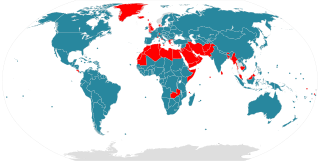
Guinea-Bissau, officially the Republic of Guinea-Bissau, is a country in West Africa that covers 36,125 square kilometres (13,948 sq mi) with an estimated population of 2,026,778. It borders Senegal to its north and Guinea to its southeast.

A secular state is an idea pertaining to secularity, whereby a state is or purports to be officially neutral in matters of religion, supporting neither religion nor irreligion. A secular state claims to treat all its citizens equally regardless of religion, and claims to avoid preferential treatment for a citizen based on their religious beliefs, affiliation or lack of either over those with other profiles.
Freedom of religion in Sri Lanka is a protected right under Chapter II, Article 9 of the constitution of Sri Lanka. This applies to all religions, though Buddhism is given the foremost place under the 1978 Republican Constitution. Sri Lanka is regarded by its Supreme Court as being a secular state.
The Catholic Church in the Cape Verde is part of the worldwide Catholic Church, under the spiritual leadership of the Pope in Rome. The country is divided into two dioceses: Mindelo and Santiago de Cabo Verde.

The National Administrative Department of Statistics (DANE) does not collect religious statistics, and accurate reports are difficult to obtain. However, based on various studies and a survey, about 90% of the population adheres to Christianity, the majority of which (70.9%) are Roman Catholic, while a significant minority (16.7%) adhere to Protestantism and other Christian groups.

Christianity is the religion of 6% of the population of Djibouti. Christians are mostly of Ethiopian and European ancestry. Most Christians are Ethiopian Orthodox or Roman Catholic. The constitution of Djibouti includes freedom of religion, although Islam is the state religion. There is a tolerant attitude between religions in general. Proselytizing by any faith in public is not allowed.

Christians in Benin constitute approximately 48.5 of the country's population.

Christians are estimated to make up approximately 1% of the population in Bhutan, or approximately 8,000 people. Other figures suggest that they are more than 2% of the population.
The Constitution of Andorra provides for freedom of religion; it also names the Roman Catholic Bishop of Urgell as joint head of state with the President of France, offering the Catholic Church privileges not available to other religious groups.

Yemen is an Islamic society. Nearly all Yemenis are Muslims, with approximately 60% belonging to Sunni Islam and 40% belonging to Shia Islam (Zaidi). Amongst the native population, there were approximately 1,000 Christians, and 6 remaining Jews in 2016. However, Pew-Templeton estimates the number of Christians to be as high as 40,000, though most do not publicly identify as such, due to fears of religious persecution. According to WIN/Gallup International polls, Yemen has the most religious population among Arab countries and it is one of the most religious populations world-wide.

Christians, most of whom are ethnic Russians, constitute less than 11% of the population in Turkmenistan; Eastern Orthodoxy in Turkmenistan is the main form of Christianity.

Christianity is the largest religion in Benin, with substantial populations of Muslims and adherents of traditional faiths. According to the most recent 2020 estimate, the population of Benin is 52.2% Catholic, 24.6% Muslim, 17.9 Animist and 5.3% follows other faiths or has no religion.

Christianity is the most widely professed religion in Zimbabwe, with Protestantism being its largest denomination.
Of the religions in Tunisia, Islam is the most prevalent. It is estimated that in 2022, approximately 99% of Tunisia's inhabitants identified themselves as Muslims.
Religion in Guinea-Bissau is diverse, with no particular religion comprising an absolute majority of the population. Islam is the most widely professed faith, and significant populations of Christians and adherents of Traditional Faiths are also present in the country.

The majority of the population of East Timor is Christian, and the Catholic Church is the dominant religious institution, although it is not formally the state religion. There are also small Protestant and Sunni Muslim communities.
Christianity is the dominant religioninPalau, practiced by around 91.3% of the total population, according to the 2015 census. Freedom of religion is enshrined in Palau's constitution.

Christians in the Gambia constituted Muslim 96.4%, Christian 3.5%, other or none 0.1%.
Religion in Guinea is approximately 89% Muslim, 7% Christian, with 2% adhering to indigenous religious beliefs in 2022. There are also smaller numbers of Atheists and practitioners of other religions in the country. Much of the population, both Muslim and Christian, also incorporate indigenous African beliefs into their outlook.
Christianity in Equatorial Guinea dates back to pre-independence, when Equatorial Guinea was a colony of Portugal and Spain. In 2023 almost 90% of the population are Christian. Of these 71% are Roman Catholics, though there are also a few thousand Protestants, mainly from the Reformed Church, but also Methodists and Presbyterians.









